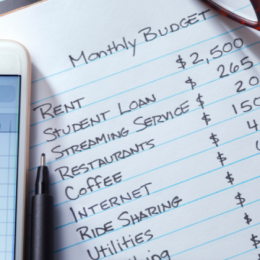Posted On: September 26, 2021 by Home State Bank in: Personal Banking

School is here and if you’re attending college, you’re probably going to be in charge of more of your finances with your newfound independence.
Taking on more financial responsibility is a great way to learn about money, saving, budgeting, and more, but it can also be easy to get distracted and find yourself in over your head.
College is the perfect time to develop lifelong financial skills and explore what works for you and what doesn’t.
It’s never too early to begin good financial habits. Similar to your school checklist, we’ve put together a financial checklist to follow throughout this school year to help you save money and make smart financial decisions now and for your future.
1. Understand Your Bank Accounts
Make sure you have the specific methods for payment/receiving that you need from your bank. This means having a bank account with both a checking and savings, having checks, a debit card, and also a credit card (we’ll tell you about why you’ll want this soon).
Make sure you understand what possible fees there are, such as overdraft charges, interest rates, etc.
Trying to save for something specific over the school year? You can open multiple savings and checking accounts to sort and save easily.
2. Create a Budget
This will be vital to your financial independence. You need to determine what your budget is. If you’re working, it’s important to determine how much goes towards spending and how much towards savings.
Make sure you understand what you expenses are, both one-time and ongoing.
We recommend beginning with the following budget categories and then adjusting per your needs and circumstances: Food, bills (this could be tuition, cell phone, etc.), books and supplies, dorm needs such as toiletries and laundry needs, transportation (if you have a car or take a bus), and entertainment (remember, you’re supposed to have fun, too!).
3. Have an Emergency Fund
Life always seems to bring about the unexpected. Make sure you’re putting aside savings for emergencies, even if only small amounts right now. This is different than regular savings you may be building to pay off student loans or to buy a car. This money should be earmarked for unexpected emergencies, such as medical needs, broken car part, etc.
Even though you probably won’t have many emergencies during your college years, this is a lifelong financial tip that will serve you once you graduate and begin your next chapter.
4. Build Good Credit
As we mentioned in your first item on this checklist, it’s important to start building credit for future needs like buying a car, a house, or other larger investments. Now is the time to start building credit, but there are some simple rules that should be followed when doing this:
- Always pay off your balance every month.
- Find a card with low or no annual fees and hopefully one with a better interest rate. Some even have some great reward options, but be careful not to go crazy to get the rewards. If you pay off your balance every month, the interest rate won’t matter, but if you don’t, that could come back to bite you.
- Include your credit card purchases in your budget so you know you can pay it off. Maybe you only use your credit card for toiletries and your cafeteria fee.
It can be easy to start using a credit card for all your purchases, but it should only be used sparingly and always paid off to build your credit score while also being financially smart and not accruing debt.
5. Buy Secondhand
This is college, not your first home. Be financially smart and purchase things secondhand or even free! New textbooks can cost an arm and a leg, but there are many online sites or even previous students willing to sell them for much less.
If you do need to buy new, don’t buy expensive. Understand that most of the items will only be used for your college career, so buy generic and cheap.
6. Be Frugal
In addition to buying inexpensive items, ask and utilize student discounts. Many stores, restaurants, and other places, especially surrounding or on campus will have student discounts. Make sure to always ask.
Also take advantage of places like the library that let you rent movies, instead of going to a theater. Opt out of fast food and create a meal plan to follow.
7. Keep Your Money Safe
Most likely you’re sharing a dorm room or an off-campus dwelling with others. Be careful about where you stash your cash and make sure others don’t know where you keep it. It’s good to have cash on hand, but don’t keep too much and make sure to deposit any large amounts quickly into your account.
8. Find a Job
This might seem off-putting going to college, especially if you have a big course load, but there are lots of on-campus jobs that you can apply for and do while also still having time for homework and fun.
Front desk is a great job to get your studying done while also making some spending money. You can also look for part-time weekend jobs at local restaurants or cafes. It’s not forever, but it helps pay the bills and give you extra entertainment money depending on your needs and budget.
Also, the more you work, the less time you have to spend money!
9. Keep Track
All of the above are great, but if you don’t keep track, you're wasting time (and most likely money). Set aside time each week or better yet, 5-10 minutes every morning to check your finances. This could be a quick login to your accounts to check your balance, pending items, credit card balance, etc. If you get in the habit of doing this everyday, it will become routine and take less and less time.
10. Have Fun!
College is a time for fun as well as exploring and growing your knowledge base. You’ll have even more fun if you know you’re not running yourself into a financial free fall with credit card debt and unnecessary spending.
Make time for fun and make sure to include an entertainment bucket in your budget. And you don’t need to spend a lot of money to have fun. Plan for eating our once per week or for a monthly outing. Planning ahead and knowing costs will help it fall into place and create more joy for you.
Looking for more financial tips? Call Home State Bank and schedule a conversation with one of our financial advisors to help you reach financial freedom and make the best decisions for every stage of your life.
Home State Bank is a Member FDIC



0 comments